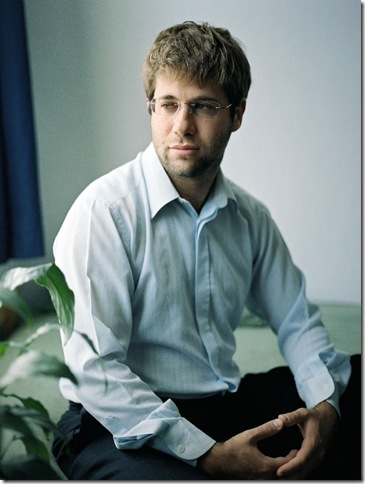It takes some kind of pluck and courage to play a serious chamber music recital with the kind of piano that was available Saturday afternoon to violinist Tomas Cotik and pianist Tao Lin: a much-used brown Baldwin upright.
But the two musicians soldiered on regardless, though the sound quality would have been much different with a concert instrument, and managed to make a large audience at the Northwest Regional Library in Coral Springs quite happy.
Cotik, a native of Argentina whose local performance gigs include the second violin chair of the Delray String Quartet, brought an all-Schubert program to the library’s multipurpose room as a tryout for a concert Aug. 28 at UM and a future recording of the works. Outside of violin circles, Schubert is scarcely known these days as a writer for violin and piano, and yet these pieces have all of the composer’s most beguiling features, especially lovely melody and bold harmonic changes.
In remarks to the audience, Cotik said Schubert’s violin works are the subject of his doctoral study at the University of Miami, and it was clear from his performance of the three pieces on the program that he admires these pieces and wants to do right by them. But while Cotik plays with admirable technical finish, his tone was almost always soft and thin Saturday; so many of the passages in the recital would have been much more memorable had he applied more color here, some added interpretive wit there.
The recital opened with the Sonata (Grand Duo) in A, D. 574, which begins with a little rustic motif in the left hand, vamping, and Lin did the best he could with the muddy sound from the piano he had to play. Actually, he played quite well throughout the recital, especially given the limitations of the Baldwin, and he deserves credit for uncomplainingly shouldering the pianist’s special burden of not knowing until you get to the hall what kind of instrument you’re dealing with.
Cotik gave the first movement a careful performance, clean and clear but somewhat too reticent, particularly in the returns of the main theme, which called out for a bit more breadth. There was good fingerwork in the second movement, light and precise, but Lin’s playing had more presence than the soloist.
The gentle slow movement that followed was beautifully suited to Cotik’s quiet art, and he handled its stormier moments well. The finale, again, was accurate and expert, but not very engaging. It’s the kind of Beethovenian sudden-shock writing that needs a stronger sense of drama to really make the music shine.
The Rondo in B minor (D. 895) that followed is one of those remarkable Schubert pieces that just seems to spin out new, ear-pleasing material endlessly. Written for a rising young virtuoso named Josef Slavik (who was sadly short-lived), it’s written in the attention-getting style of the day, with a dramatic slow intro that gives way to a lively main section full of technical dazzle.
Here again, Cotik has worked hard to master every bar of this difficult, showy, relatively long work, and his extensive preparation shows in his laudable level of technical accuracy. The main section is derived from a dance Schubert wrote earlier, but Cotik’s performance had little of the swing and swagger that the music seems crafted for. In the G major contrasting theme, for which Lin brought the volume down to a hush, Cotik played with tenderness and warmth, but the larger sense of contrast was lost because the primary section wasn’t as big and bluff as it needed to be.
After the intermission, the two returned with the Fantasy in C (D. 934), also written for Slavik. Out of the murmuring tremolandi in the piano, the violin sings a slowly climbing scale pattern that touches on minor and major as it rises. This motif returns in the middle of the piece, in a lower register, and in the performance Saturday, that would have been an ideal time to make a dramatic statement out of the return, but instead it was simply played smoothly. Not a bad thing, but also not theatrical enough.
Much of this work features a Hungarian-style tune that chugs along in its folk-like way, and then serves as a template for plenty of bustling scales for both players. There was not nearly enough accent or drive to this section, though Cotik’s playing was unobjectionable technically, and Lin brought plenty of fire to his frequent scale passages.
The contrasting mid-section was pretty and delicate, and the elaborate variations that come afterward were ably handled by both musicians and made an impressive impact. The closing section, though, would have benefited hugely from more of the grand gesture, not least because the main theme is second-drawer Schubert, and can use the boost.
Tomas Cotik is unquestionably a fine violinist, a musician who prepares thoroughly and has great respect for the music he performs. Now he needs to add much more color to his playing, a much bolder sense of drama, a stronger sense of line, more volume, more presence. Schubert certainly wrote two of these pieces with a specific personality in mind, and it would be most enjoyable if Cotik was able to reflect that in his next outings with these fine pieces.
Tomas Cotik and Tao Lin play this same program Saturday night at the Arts Garage in downtown Delray Beach. Tickets for the 8 p.m. show are $20 in advance, and $25 at the door; visit http://artsgarage.eventbright.com/ or call 450-6375. They will play it again at 4 p.m. Sunday, Aug. 28, at Gusman Hall on the campus of the University of Miami in Coral Gables. Admission for that concert is free.
